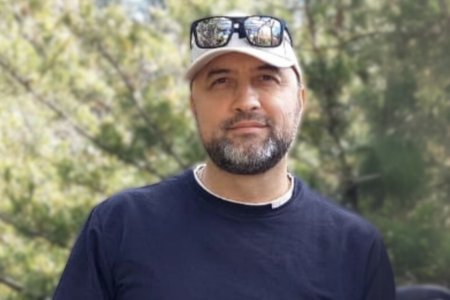
Russia has sentenced Serhiy Yerzhov, a 43-year-old Crimean, to 18 years’ maximum security on extraordinary charges linked with an alleged explosion on a gas pipe in June 2023. While details are few, there are telltale features suggesting that Yerzhov has become the latest victim of Russia’s conveyor belt prosecutions of Ukrainians on fake ‘sabotage’ charges.
Many of these ‘Ukrainian saboteur trials’ are based on unprovable claims that the Russian FSB [security service] ‘thwarted’ an act of sabotage. In this case, there are records from 23 June 2023 indicating that a gas pipe was damaged. The reports, however, speak only of damage, with nothing to indicate whether this was a deliberate attempt to blow up the pipe. The damage does not appear to have been substantial since the occupation ‘authorities’ promised to quickly reinstate the gas supply to 500 homes.
By 5 July 2023, the Russian Baza Telegram channel had reported that a man had been detained on suspicion of trying to blow up the gas pipe and that he had already ‘confessed’. He was described as a 42-year-old from Pavlohrad (Dnipropetrovsk oblast) who was registered [as living] in occupied Yalta and had taken Russian citizenship. Since Russia has made it all but impossible on any occupied Ukrainian territory to live and work without taking a Russian passport, the latter is hardly surprising. Baza stated then that Yerzhov had ‘admitted to blowing up the gas pipe, and that he had been charged with deliberate damage to property, with this, according to the report, meaning that he faced five years’ imprisonment.
That earlier report is just one of the many reasons for scepticism about the huge escalation in the charges against Yerzhov. A full month passed before the Russian state-controlled TASS press agency reported the ‘detention’ and posted the unnamed man’s ‘confession’. By then, it was asserted that “the FSB have detained a Russian who blew up a gas pipe in Crimea on instructions from Ukraine’s Security Service”. Yerzhov had, thus, been held in Russian captivity, incommunicado and without access to an independent lawyer, for over a month before his arrest was officially acknowledged. There is ample evidence that such periods are used by the FSB to extract ‘confessions’, most often through torture.
There are also other standard features of ‘confessions’ obtained through duress. While accusing Ukrainians of ‘sabotage’, the FSB do not want to suggest that they were motivated by patriotism and opposition to Russian aggression. Instead, they invariably get the person to claim that Ukraine’s SBU [Security Service] offered money or, as in this case, that they tried to “blackmail and threaten” him into working for them.
The final indictment included several articles from Russia’s notorious ‘terrorism’ legislation, with the ‘trial’ taking place at the Southern District Military Court. The latter regularly passes huge sentences, despite the lack of any crime, against Crimean Tatar and other Ukrainian political prisoners.
On 30 July 2024, the Crimean Human Rights Group2 reported that this ‘court’ had found Yerzhov guilty of ‘an act of terrorism causing grave consequences’ (under Article 205 § 2 of Russia’s criminal code); of ‘undergoing training in order to carry out terrorist activities’ (Article 205.3); illegal preparation of explosive devices (Article 223.1 § 1) and ‘illegal preparation and possession of explosives (Article 222.1 § 2b). The first four years of the sentence are to be in a prison, the worst of Russia’s penal institutions, with the remainder in a maximum-security prison colony. He was also ordered to pay a massive 500 thousand rouble fine.
The prosecution claimed that Yerzhov had been in Dnipropetrovsk oblast from 24 February to 8 November 2022, and that he had supposedly got in contact with an SBU officer. Under the latter’s leadership, he was claimed to have gained knowledge and practice in making homemade explosive devices. He had purportedly received instructions from this SBU officer on 12 June 2023 to prepare an explosive device, with information as to where the components were to be found. He was supposed to have placed the explosive device on the gas pipe and then detonated it by remote control.
There is nothing to indicate whether Yerzhov was ever able to consult with an independent lawyer. In very many of these cases, the ‘investigators’ have actively blocked such access, almost certainly because the person accused regularly retracts their ‘confession’ and provides harrowing, and consistent, testimony of the electric shocks, beatings, mock executions and other forms of torture used to obtain them.



